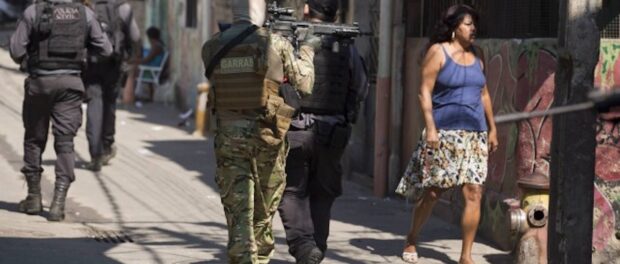
For the original article in Portuguese by Luís Eduardo Macedo published by Agência de Notícias das Favelas click here.
The suffering of the most vulnerable segment of society, most impacted by Rio’s violence.
Violence affects favela residents in one way or another. Many see their friends or relatives killed. Others may experience material loss—a water tank punctured in the crossfire or clothing torn from the clothesline, roofs sprayed with gunshots, walls and windows pockmarked with bullet holes. The damage is incalculable for those who live under the constant threat of war that can erupt at any moment, but money can’t buy back residents’ mental health, so impaired by the psychological pressure of these conditions.
The government should be as concerned with residents’ quality of life as they are with intense back-alley shootouts involving rifles that fire at a two-kilometer range. Beyond the lack of adequate basic sanitation, residents are barred from exercising their right to come and go as they please. Under these circumstances, residents must still find a way to fall asleep at night and then wake up early the next morning for work or school, as if nothing has happened.
Over time, fatigue grows and mental health deteriorates. But there is no aid for these victims. An unpublished study by the Oswaldo Cruz Foundation (Fiocruz), “The Impact of Armed Violence on the Living Conditions of Favela Residents in the City of Rio de Janeiro,” interviews residents from Manguinhos, Jacarezinho, and Maré in order to learn more about the weight of violence in their lives.
The study points to prevalent mental suffering among residents, principally provoked by the news of murdered friends, relatives, and neighbors, in addition to police violence. Approximately 80% of interviewees felt that armed violence affected both their own health and the health of their families and loved ones. In other words, all residents appear to be suffering, either physically or mentally.
According to William Berger—a psychiatrist, professor at the Federal University of Rio de Janeiro (UFRJ), and researcher for the Integrated Laboratory for Stress Research (LINPES/UFRJ)—the mental health of those who live through this violence may be even worse than that of soldiers on the battlefield. He provides the example of U.S. soldiers in Iran and Iraq, who receive mission training. They go to battle then return home and receive support for dealing with adverse situations. The civilian population has no such training and is thus more vulnerable to forms of suffering.
Berger explains the physical effect of this high level of stress and fear. It often leads to excessive adrenaline production, which raises blood pressure and causes headaches, muscle tension, and gastrointestinal problems. Berger estimates that half of all people living in Rio’s favelas suffer from depression. “It is clear that residents of a violent city are more likely to suffer and feel pain,” notes Hugo Fernandes, superintendent for mental health at the Municipal Health Secretariat of Rio de Janeiro.
Unfortunately, violence in Rio seems to be getting worse, with increasing numbers of shootings in recent years. According to Fogo Cruzado, an unofficial collaborative platform for mapping gun violence in Rio de Janeiro, there were 688 shootouts and shootings in the first month of 2018 alone. That is a rate of 22 per day, making January 2018 the most violent month since Fogo Cruzado was founded on July 5, 2016.
In the first 100 days of 2019, there were 22 shootouts involving three or more civilians killed at a time—exactly the same number of cases as in the first 100 days of 2018. These types of cases, however, resulted in 89 deaths in 2019—up 7% from the 83 cases registered for the same period in 2018. Another important difference is that half of such cases in 2018 (11) involved the presence of security forces. In 2019, the number of cases involving security forces rose to 17.

